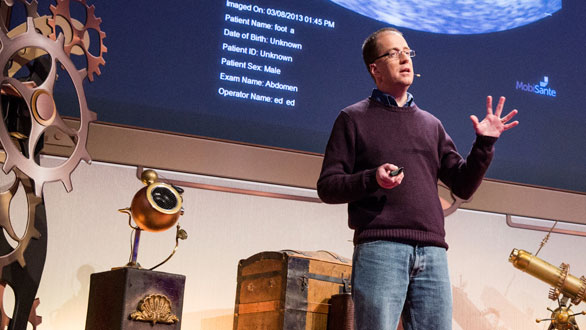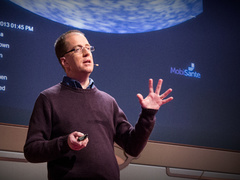
Eric Dishman is used to thinking about how technology can transform the world of health care. As an Intel Fellow and general manager of the company’s Health Strategy & Solutions Group, his job is all about finding innovative new approaches to healthcare.
 Eric Dishman: Take health care off the mainframe
And he’s no stranger to talking about them. At TEDMED 2009, in the talk featured to the left, Dishman asked us to “Take health care off the mainframe,” boldly comparing the current American health care system to mainframe computers circa 1959.
Eric Dishman: Take health care off the mainframe
And he’s no stranger to talking about them. At TEDMED 2009, in the talk featured to the left, Dishman asked us to “Take health care off the mainframe,” boldly comparing the current American health care system to mainframe computers circa 1959.
But just two weeks ago, at TED@Intel, Dishman tells the much more personal story of his battle with kidney disease.
To say that his battle is with disease isn’t the full story. Instead, as he describes in this second talk, his fight is not only with faulty kidneys,
 Eric Dishman: Health care should be a team sport
but also with a flawed healthcare system.
Eric Dishman: Health care should be a team sport
but also with a flawed healthcare system.
Two decades ago, when he was a college student, Dishman had several fainting spells. This kicked off months of testing by six different doctors, in what he describes as a “clash of medical titans.” Dishman was told he would not live longer than two or three years.
The doctors were wrong — but not because they weren’t good doctors. Instead, they were stuck in an old-fashioned system that lacked technologically advanced tools and a culture of communication.
With smartphones and tablets becoming ubiquitous, and social networks connecting us more and more, Dishman sees three major steps to achieving better, individually-tailored healthcare that takes pressure off of brick-and-mortar hospitals and clinics, and empowers a patient to be the captain of a team working toward their well-being: Care anywhere, care networking, and care customization. To hear what each means, watch this talk.
On the stage, Dishman demonstrates MobiSante’s smartphone-based ultrasound imaging system, called MobiUS, which he used to scan his newly donated kidney. A doctor hours away at Legacy Good Samaritan Hospital in Oregon examined the kidney live over the Internet, dispelling worry over a few dark spots and noting they’d double check them at Dishman’s next scheduled appointment.
Here is a round up of other disruptive products and projects that could hugely impact the way we think about our health care. Have more to add? Put them in the comments.
Health tests on your smartphone
MobiSante’s affordable, portable ultrasound isn’t the only medical device to take advantage of mobile networks and the power of smartphones. Some other examples:
- Lifelens’s app can detect malaria in a blood sample and allow a diagnosis from across the world.
- University of Oxford’s stethoscope kit is a low-cost way for patients to take recordings of their hearts to send it to their doctors for analysis.
- MIT Media Lab’s NETRA is a cheap eye test that connects to a smartphone. Here, a look a TED Blog Q&A with one of its creators.
- Withings’ blood pressure monitor lets users take their own blood pressure with an iPhone, iPad, or iPod touch.
The doctor isn’t in… but that’s okay
InTouch Health’s RP-VITA Remote Presence Robot is the first-ever that will connect doctors to patients across the world.
 Daniel Kraft: Medicine's future? There's an app for that
Doctors can do rounds in a hospital across the country or the world, controlling Jetson-like robots that show their faces on a screen. Through the robots, the doctors can visit with and diagnose patients from afar.
Daniel Kraft: Medicine's future? There's an app for that
Doctors can do rounds in a hospital across the country or the world, controlling Jetson-like robots that show their faces on a screen. Through the robots, the doctors can visit with and diagnose patients from afar.
Another less-futuristic option: as Daniel Kraft, the chair of the FutureMed program at Singularity University, mentioned in the TED Talk, “Medicine’s future? There’s an app for that,” the website AmericanWell.com can connect you to physicians and specialists in your state who do appointments over secure chat, Skype or the telephone.
Health care at your local drugstore
While it isn’t tech-heavy, the move towards what this recent article from The Economist calls “retail clinics” is taking some health services out of hospitals and doctor’s offices and into malls and popular pharmacy chains. The article details how CVS and Walgreens are bringing basic care clinics to many stores – 640 and 372 of them respectively.
Medical devices that can leave the hospital
The U.S. Department of Health and Human Services put out a recent request for information seeking new approaches for smart medical hardware that can remain on even during power outages in natural disasters. The goal is to to protect hospital patients on life-saving medical devices — including ventilators or IV pumps — by keeping the machines on and mobile if there is need for evacuation.
Are you interested in where health care is going? Watch the TED Playlist, the Future of Medicine, below.
Comments (12)
Pingback: Hot Technologies for Healthcare in 2014 | Innovative Workflow Technologies
Pingback: Mobile Apps & Peripherals – What’s Ahead for Humanity | Android App Development Quotes
Pingback: Solid State Logic debuts Live | Toki Solutions
Pingback: MPEG HEVC compression not ready for primetime | Toki Solutions
Pingback: HTC E1 headlines company’s Chinese online store with custom options (video) | Toki Solutions
Pingback: How technology can empower patients, with 4 home tests on your … » FXP123
Pingback: tapzat » How technology can empower patients, with 4 home tests on your …